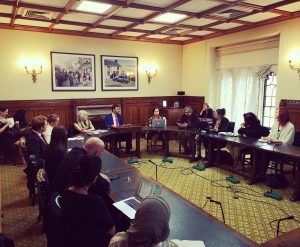The All-Party Parliamentary Human Rights Group (PHRG) and the Bar Human Rights Committee held a Panel Discussion in Parliament, on 26 June 2019, on “The Extraordinary Scale of Human Rights Violations in Xinjiang”.
We would like to thank Afzal Khan MP (AK) for chairing this event.
The speakers were:
- Nicola Macbean – Director, The Rights Practice (NM);
- Rahima Mahmut – Uyghur singer, award-winning translator and human rights activist (RM);
- Serena Gates – UK Criminal Barrister, and member of Justice Rapid Response/ UN Women Panel of experts for investigating violations of International Humanitarian Law and human rights abuses (SG).
The main points were:
- The PHRG and Bar Human Rights Committee will raise these human rights concerns in China – to urge the international community, including the UK Government and Parliamentarians, to do more to help support and protect human rights victims there – many of whom cannot speak up for themselves, not least because of the very real risk of reprisals. Sadly the world’s response so far has not matched the gravity of the situation. (AK)
- Though it is not possible to know exactly how many are being detained in Xinjiang, it is believed, based on evidence including official procurement documents, satellite imagery, former detainees and detainees’ families, that 1 to 1.5 million Uighurs and other Muslims are being held. (NM)
- When people started being detained around 2017, the Chinese Government denied it, but now seek to justify it by claiming it serves to counter extremism and terrorism. (NM)
- There is no basis in law to compel Uighurs and others to attend “vocational/educational” training centres (which require them to be resident). Article 37 of China’s Constitution prohibits unlawful detention, and the police, and counter-terrorism laws, can only impose detention for up to 15 days. There have also been reports of forced labour in factories. (NM)
- Chinese lawyers would find it very difficult to challenge these detentions through the Courts; they would lose their licenses or worse if they tried. (NM)
- There is no external monitoring of detainees’ treatment or detention conditions. There have been reports of deaths, ill-treatment and even torture in detention. (NM)
- In addition to widespread unlawful detention, there has been a sharp increase in criminal cases in the region, with a five-fold increase between 2014 and 2017. No legal aid is available and the political sensitivities involved mean the criminal justice system is unlikely to be able to deal with such cases impartially. (NM)
- The UN Committee on the Elimination of Racial Discrimination (CERD) has called on China to end extra-legal detentions; China is due to report back to them on this by end August. (NM)
- Almost 90% of Uighurs living in exile no longer have information about, or contact with, their families. (RM)
- There have been 3 deaths in detention reported in the last two weeks, with one allegedly resulting from the deprivation of medical treatment. (RM)
- The climate of fear in Xinjiang is widespread, and the pressure on the Uighur population is huge: a knock on the door now frightens everyone. People are very worried about the use of surveillance and name filtering by computer, on the basis of which they can be summoned to the police station and then taken to a detention facility. (RM)
- Children whose parents are detained can be taken to state orphanages. (RM)
- Globally, strategic litigation for Crimes Against Humanity can be brought against Governments. The forcible transfer of parts of the population to detention facilities, as in Xinjiang, amounts to grave human rights abuses, and may even amount to Crimes Against Humanity. Establishing an evidential basis would be important to determine the latter. (SG)
- Although there is no possibility of a referral to the International Criminal Court, other states could prosecute China for Crimes Against Humanity, in some circumstances, under universal jurisdiction. (SG)
- A UN fact-finding mission should be sent to Xinjiang in order to collect evidence, and then report back to the UN Human Rights Council. (SG)
- In the absence of a jurisdiction or international political will, private prosecutions, including in the UK, could be considered. Whether UK companies are involved in supply chains which include factories using forced labour in Xinjiang should also be examined. (SG)
- The UK Government could consider asset freezes and export control measures (including of surveillance equipment) to put pressure on China. (SG)
- China is particularly worried about separatist feeling in Xinjiang because of its importance to the Belt and Road initiative and better trade links. (SG)
- Yasmin Qureshi MP has been following developments in Xinjiang, and spoken in Parliamentary debates. She is aware of many UK Parliamentarians’ concern and is currently setting up an APPG to focus on it, with an inquiry.
- Myrto Tilianaki from Human Rights Watch highlighted their recently published report on how mass surveillance works in Xinjiang, with police generating lists of those who are considered untrustworthy, and then often subsequently detained. Human Rights Watch is asking for this information to be deleted. Link to report: https://www.hrw.org/report/2019/05/01/chinas-algorithms-repression/reverse-engineering-xinjiang-police-mass-surveillance
- More needs to be done by all, including those on the newly established APPG, to stop these abuses. (AK)
The PHRG will continue to follow developments in Xinjiang closely, and to raise related concerns with relevant interlocutors, with a view to getting the UK and wider international community to do more to bring these violations to an end and hold perpetrators to account.


